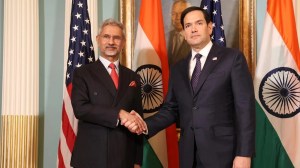Hard-chore days
The government appears belatedly to have launched a damage limitation exercise for the budget. Prime Minister Atal Behari Vajpayee has bee...

The government appears belatedly to have launched a damage limitation exercise for the budget. Prime Minister Atal Behari Vajpayee has been explaining to BJP MPs why he does not think it a good idea to roll back subsidy cuts and is trying similarly to win over National Democratic Alliance allies.
Finance Minister Yashwant Sinha ne-eds all the help he can get to put across his case that the harsh measures announced in the budget were absolutely necessary. The proposals are not going down well anywhere in the country. In fact the government is beginning to look quite isolated on the issue of cuts in food and fertiliser subsidies and that is only the beginning. National Democratic Alliance allies led by the Trinamool Congress are saying they want a rollback of plans to privatise PSUs and there is grumbling within the Sangh Parivar.
No doubt the government is still assessing the strength of the opposition to various budget proposals, deciding how best to counter it politically and what trade-offs are possible. It needs to act fast.
Vajpayee ought to have done his political homework and cannot claim to be caught unawares by the hostile noises from within and without. He faces the unhappy prospect of being confronted again in Parliament, soon after the RSS controversy, by the massed ranks of the Congress and Left parties and his own allies. Therefore, if cost-cutting proposals are to be saved, the government must have a clear strategy for dealing with the political fallout.
It must be able to disaggregate the opposition to subsidy cuts, make concessions where essential without giving the appearance of knuckling under pressure, build support in the states and show deep cuts in its own expenditures. It looks like a tall order but it is hard to see how else it can still have a tough budget for 2000-2001. In essence what is involved is persuading partners and opposition parties alike that Sinha8217;s way of reducing costs and raising resources is the best possible way.
Populists in the Trinamool Congress and MDMK need to realise they cannot have it both ways. They do not want the restructuring of PSUs objections to plans for SAIL are piling up and they do not want PSU sell-offs. This is unthinking opposition from those determined to live in the past.
They should be faced down. Demagogues like Chandrashekhar who say disinvestment will lead to economic slavery can best be answered by a systematic well-thought out programme of PSU reform rather than the series of ad hoc decisions and delays which pass for reform just now. As for food and fertiliser subsidy cuts, the government has really got to make up its mind whom it wants to protect, the strong or the weak. If, as reported, the government is intending to mollify the large farmers8217; lobby and compensate for fertiliser price hikes by raising paddy procurement prices, it should think through things more carefully.
Small farmers, badly hit by fertiliser subsidy cuts, are unlikely to gain by that move. Worse, higher procurement prices mean even higher PDS prices for families below the poverty line who should never have been inflicted with 68 percent price hikes in the first place. Piecemeal solutions and half-baked measures will not do the economy good or lessen the government8217;s political headaches. Clarity of purpose is necessary.
- 01
- 02
- 03
- 04
- 05































